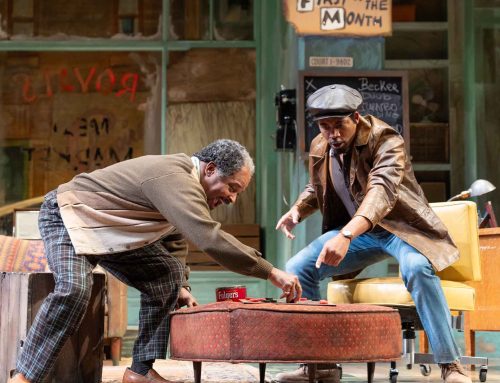 Ashland, Oregon
Ashland, Oregon
at the Oregon Shakespeare Festival
The Tragical History of Doctor Faustus by Christopher Marlowe
The only question being debated among the audience departing after Faustus is whether the evening is disappointing because of the insensitive direction of James Edmonson or whether the performance was doomed as soon as Artistic Director Libby Appel selected this 16th Century version of the classic make-a-bargain-with-the-devil fable. No one argues that Faustus is a great – or even good – theatrical experience.
Perhaps only because Faustus is still performed by many different companies, I come down on the blame-the-director side. Moreover, even if it were a stinky play, the director has given no help with his demand for broad, broader, broadest possible over-acting.
Remember the Fraiser episode where the has-been actor hammily plays Shakespeare and delivers each banal utterance as if it were a grand soliloquy? That is how every character delivers every line in this Faustus. No, I take it back. Dead flat meaningless bluster is allowed for minor characters such as the servants, scholars, and German Pope.
It’s impossible for the audience to divine any emotion, motivation, or character development because the mood starts at melodrama and only grows more frenetic.
At the end of the play, no one has changed. That’s a failure in drama which normally is a failure in writing. But in OSF’s Faustus I am not sure. We never really meet Marlowe’s title character, overacted from the start by Jonathan Haugen. From his opening scene this Faustus is too busy delivering grand lines to share any personality with the audience. We don’t understand why he’d make a bargain with the Devil, because there is no indication of his personal desires. He’s only a scenery-chewing machine with paragraphs of speeches that give him plenty of time to parade around the stage. How could anything happen when over-wrought fever pitch is a low point and billowing pomposity the rhetorical norm?
One exception: Ray Porter’s Mephostophilis is a grand evil. He’s a quiet, cunning, and an obvious enjoyer of soul enslavement. Porter alone among the cast is allowed to vary, to go down as well as up. He is wonderful, and his tongue’s sensuous reactions to serious soul-destroying actions are high points of the night.
The production is visually both stunning and satisfying. The company uses the outdoor Elizabethan stage well. Swirling smoke and brilliant colors in costumes and lighting create a triumphantly eerie setting for necromancy. The clouds of enchantment reach from the stage to the top of the flag pole and from far stage right to far stage left. It’s an impressive scope of enchantment.
Unfortunately, the visual pleasure of the evening is no match for the waste of acting talent and audience time. No matter whether it’s Edmonson’s fault or Appel’s fault, the result is unenjoyable theater.
Ozdachs rating * out of ***** .





Faustus
You gave it a whole star? That’s more than I would have given it.
I agree. Ray Porter was the only piece of decent acting. He played Mephistopheles with an amazing subtlety that was completely lacking from all the other actors. Haugen is just hamming and declaiming, rather than acting.
Though unhappy with the acting, I must say it’s not a particularly interesting play. Part of Shakespeare’s genius is that all of his characters feel like real people. Marlowe just presents us with lots of archetypes.
Overall, I was rather unhappy with all the outdoor plays this year. Love’s Labor’s Lost was an excellent production, but of a play that I’ve always hated, and in which nothing actually happens. And Twelfth Night, though a perfectly adequate production, just didn’t sparkle.
Richard III, on the other hand was magnificent.
— Frank